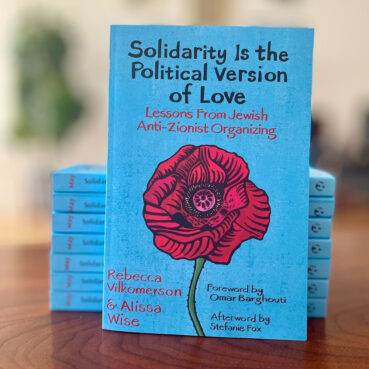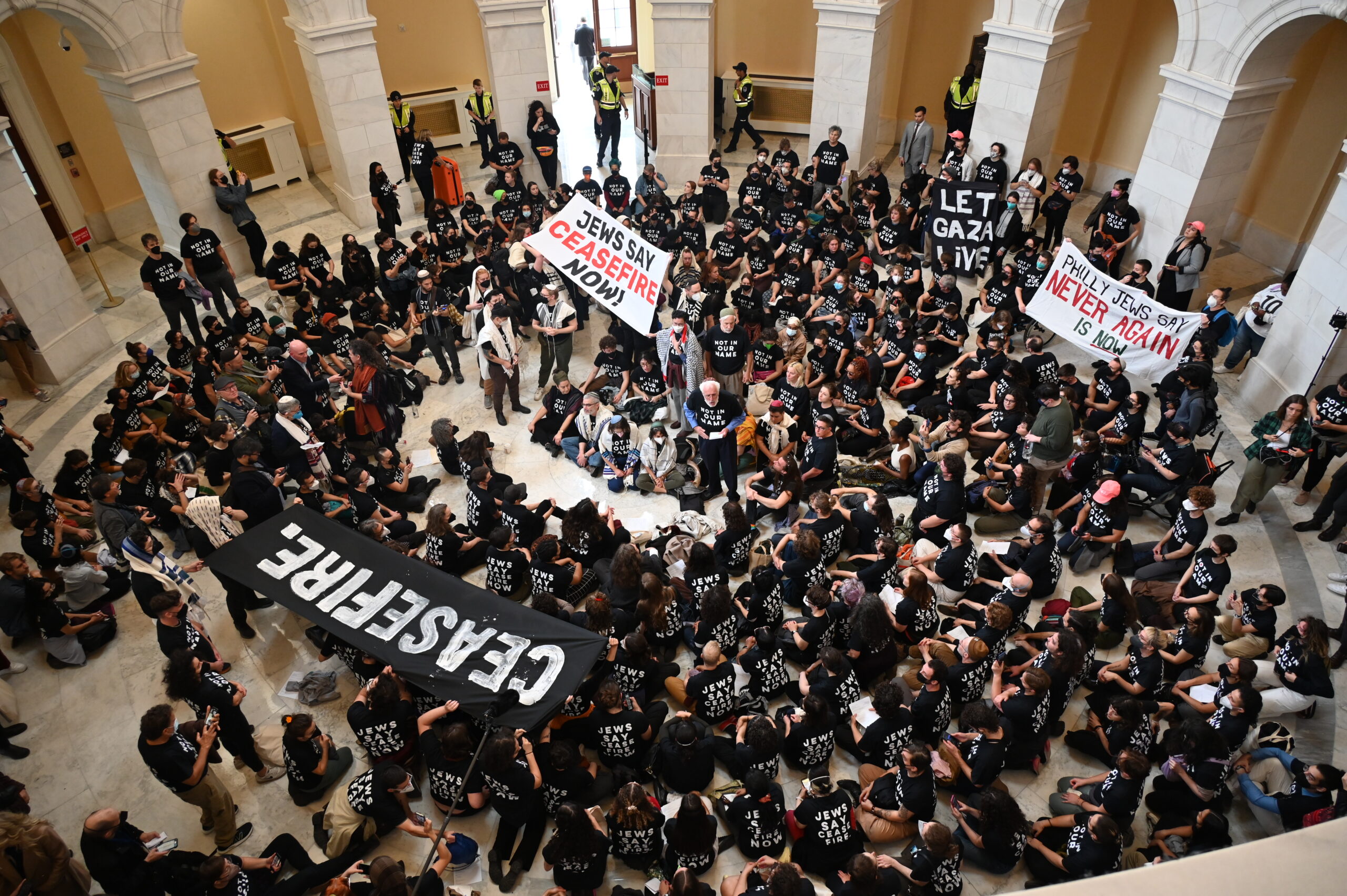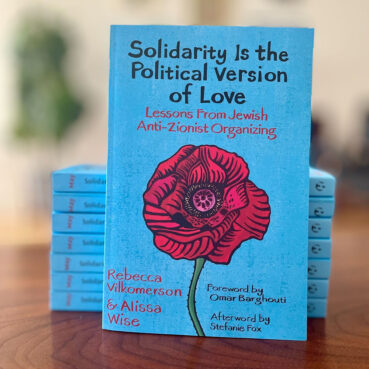
(RNS) — In 2010, Jewish Voice for Peace, a Palestinian solidarity group, mounted one of its most successful protests in its then 14 year history. Israeli Prime Minister Benjamin Netanyahu was scheduled to speak at the Jewish Federation General Assembly in New Orleans. JVP planted a handful of activists in the audience. One by one, they rose from their chairs, unfurled banners and shouted out statements, such as “The occupation delegitimizes Israel,” before being escorted out by security.
Each time, Netanyahu’s speech was disrupted.
Those tactics were prominently on display over the past year as Israel launched an ongoing military campaign on the Gaza Strip in response to a Hamas attack on Israel on Oct. 7.
The organization, which now has more than 80 chapters across the country and close to half a million people on its email list, has blocked highways, staged sit-ins (including several inside the U.S. Capitol rotunda) and had members chain themselves to the White House fence. JVP has become a powerhouse of the American Jewish left and the first major Jewish organization to declare itself anti-Zionist.
Rebecca Vilkomerson and Rabbi Alissa Wise have now teamed up to write an analysis of the decade they each worked for the organization. Both women have since left JVP to do organizing work elsewhere. Vilkomerson, who headed JVP from 2009-19, now co-directs the Funding Freedom project, which supports Palestinians through philanthropy. Wise is the founder and lead organizer of Rabbis for Ceasefire.
“Solidarity Is the Political Version of Love: Lessons From Jewish Anti-Zionist Organizing” by Rebecca Vilkomerson and Alissa Wise. (Cover art by Wendy Elisheva Somerson)
Their book, “Solidarity Is the Political Version of Love,” traces the evolution of JVP, from a Bay Area group of mostly University of California, Berkeley, students, through to its endorsement of the Boycott Divestment and Sanctions movement against Israel in 2015 and its embrace of anti-Zionism in 2019. The manuscript was completed before Oct. 7.
JVP continues to face ferocious pushback from establishment Jewish organizations that have denounced it as not Jewish and outside the mainstream, but it has struck a deep chord with younger generations of American Jews.
RNS talked to Wise (Vilkomerson was traveling) about the book and the shifting landscape of American Jewish opposition to Israel. The interview was edited for length and clarity.
People often write tell-alls about their former organizations, yet your and Rebecca Vilkomerson’s account of your years at JVP and the challenges you faced is complimentary. Why write about a group you are no longer a part of?
I’ve really benefited from other organizers who have written books reflecting on their work, pulling out lessons, where they succeeded and mistakes they’ve made. Those kinds of books have really helped me hone my skills as an organizer. As we train organizers, we always emphasize that a campaign or a project isn’t complete until you’ve done a deep evaluation and reflection process. We felt it was incumbent upon us to do the same. We feel proud of JVP. We didn’t know what was gonna happen in this moment, but we did know, even as we were leaving, that something really significant had happened in the decade that we spent there. It’s too soon to write any definitive history, but we wanted to capture what happened in those years.
We’re contending with the fact that we have this unprecedented moment of solidarity with Palestinians that to date is not able to claim any substantive wins. We’re not seeing an end to the mass slaughter in Gaza. We’re not seeing the prisoner exchange or hostage return. We’re not seeing free-flowing humanitarian aid. We’re not seeing an arms embargo. Instead, the U.S. continues to send weapons. My hope is that the lessons of the book will be things that organizers will pick up and be able to evolve into what’s next and maybe they won’t make the same mistakes we did.
How did JVP land on its model of disruption?
JVP has benefited from being started and led by veterans of other social justice movements, whether it’s anti-war movement or the queer and feminist movements. Act Up (a group that worked to end the AIDS pandemic) is an organization that was likewise really famous for its disruptions. Given the stranglehold that this myth of consensus support for Israel has on the Jewish community, it was really clear that in order to be heard, we needed to shout, literally and metaphorically, because there is such a successful silencing of voices of dissent in the Jewish community.
In the intervening years, we’ve gone back and forth with those kinds of strategies. JVP isn’t just an organization that does street activism. It also mounts longer-term boycott and divestment campaigns, lobbies elected officials, does communal education, innovates Jewish ritual for our time.

Hundreds of demonstrators calling for a cease-fire in Gaza gather in the U.S. Capitol’s Cannon House Office Building rotunda on Oct. 18, 2023. The group was primarily organized by Jewish Voice for Peace. (RNS photo/Jack Jenkins)
JVP doesn’t require members to be Jewish. Would you say that the majority of members are culturally Jewish as opposed to observantly Jewish?
I can’t speak to the current moment of JVP. But I will say the rising generation of Jews in their 20s and 30s are much more connected to Jewish religious and spiritual life. Those that got JVP started are the veterans of social justice activism. Many are red diaper babies who came from a really strong Jewish, secular cultural tradition. But some have evolved their relationship to Jewish life through being in JVP. I find it ironic that we had been challenged over the years for being not Jewish enough, but we were bringing many more Jews into the fold of Jewish life. When you are part of JVP, you’re invited into Jewish time — freedom seders and Hanukkah lightings and everything in between.
Why are JVP members disproportionately queer? Queer people, obviously, have experienced exclusion and discrimination, making them perhaps more empathetic with the Palestinian cause. But are there other reasons?
There’s less to lose. It’s hard to get people to give up the familial and communal comfort of Jewish institutions, and for many queer people that was never there. They’ve had to build alternative communities and new families for themselves. The coming out nature of being not a Zionist when you grew up in a Zionist family is not dissimilar from coming out around sexual or gender orientation. So they have that perspective of the elasticity of Jewish practice because they’ve figured out how to make sense inside of it.
There’s also a legacy of activism. A lot of the queer people were part of the queer liberation movement. They have the skills and have the community networks.
During your time at JVP, you write that becoming anti-racist was one the biggest transformations in the organization. What led you down this path?
It wasn’t that we were ignorant of the fact that Judaism is multiethnic and multiracial. It needed to be translated into how we worked in that political space — who was in leadership, what kinds of programs and events we put on. The multiplicity of ways of expressing Jewish life actually is integral to what we think is fundamentally wrong with Zionism — it’s the homogenization of Jewish culture. But a smart political analysis doesn’t necessarily lead to having practices that signal welcome, or safeguard against people of color being harassed and targeted inside of our organization.
One criticism that JVP doesn’t show enough concern for Jews who live in Israel and what might happen to them if Zionism were to end. It that fair?
We saw our role as American Jews to create conditions by which Israelis and Palestinians can come to the table as equal partners to figure out a shared future. It wasn’t for us to dictate what would happen next, but it was up to us to mobilize grassroots support to bolster Palestinians. Palestinians still don’t have the power to come to the table as equal partners and push Israel to make concessions and negotiate a shared future where everybody’s rights are upheld and there’s dignity and freedom for all the people that live there. So we saw our role as ensuring Palestinians and Israelis are able at a level playing field to figure out that shared future. I think that there is still sense to that.

Rabbi Alissa Wise, left, and Rebecca Vilkomerson during a stop on their book tour. (Photo by Gili Getz)
Has there been any movement among Jewish organizations to welcoming JVP or is exclusion from even liberal Jewish circles unabated?
From the legacy Jewish institutional perspective, there’s no change. But I do think in the progressive and liberal space, there’s a big change. Organizations that previously were not willing to put their name on a list as a co-sponsor with JVP are doing so without blinking. That is significant. Bend the Arc, an organization that historically insisted that they only work on domestic issues, came out in support of an arms embargo. Avodah, the Jewish Service Corps, are very clear that they are not holding any kind of litmus test for who’s welcome in their community. They’re not coming out as anti-Zionists, but they’re welcoming of anti-Zionist Jews among their membership and staff.
Those of us who are paying attention understand that rising generations are not willing to go along with Israel, right or wrong, when it means the levels of mass destruction, mass slaughter, torture, humiliation, starvation that we’re seeing now. The organizations that are reading the room are guided by a sense that all human life is precious and all people are sacred. We have people who support Israel and people who don’t, but our Jewish lives and their inclusion in our Jewish community is not contingent upon support for the state of Israel. And that’s a very welcome development.

